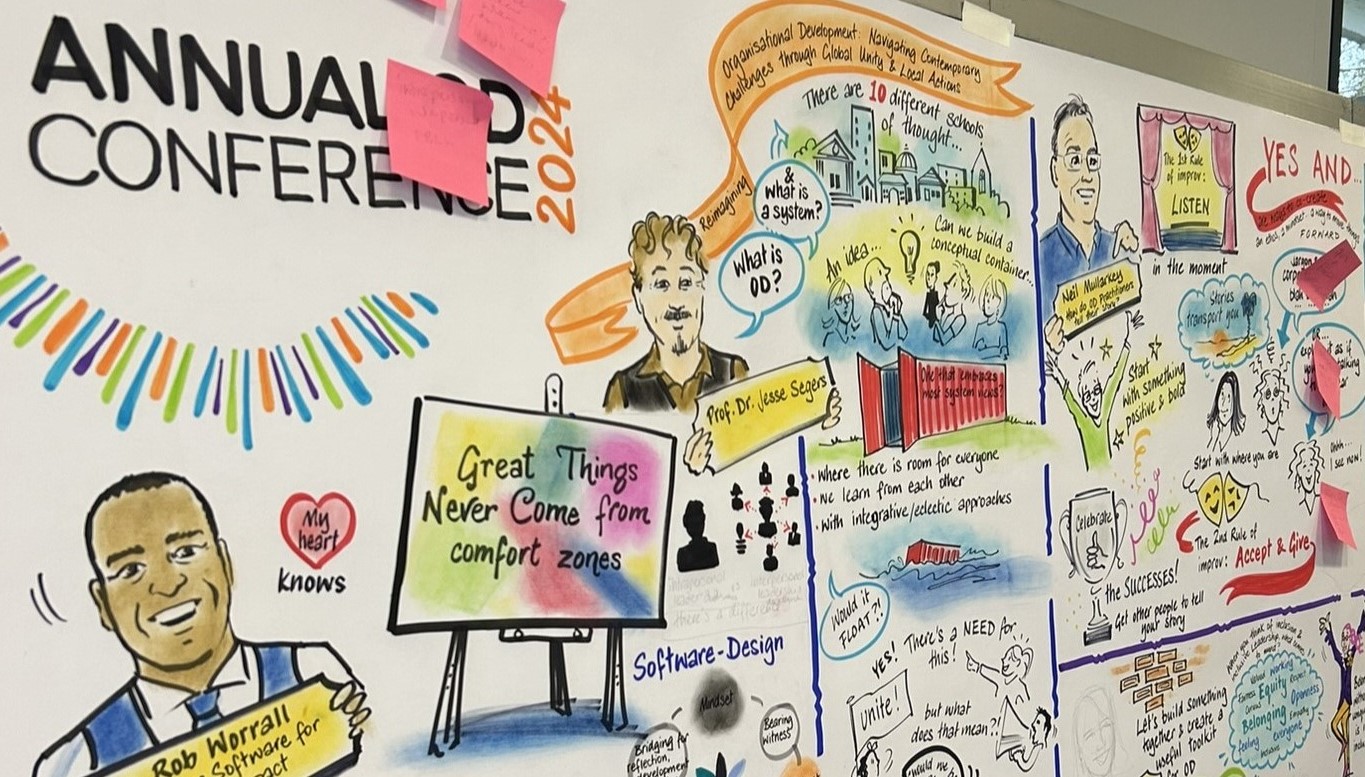As an OD Practitioner or Consultant have you ever wondered about what musical instrument might represent you best? I suspect not. But I would encourage you to take a couple of minutes and think about it.
Maybe you’d choose to be a harp. A harp may symbolise the traditional, melodic, quiet, and uncommon (let’s face it not many of us have a harp lying around in a spare room somewhere!) and is perhaps a bit forgotten about in the wider scheme of instruments. If you think of yourself as a bit solitary, more of an observer than a participant, a listener than a contributor, you may resonate with a harp.
Or maybe a guitar would represent you best? A lot of great guitar sounds are spontaneous, riffs that go off in unintended directions. Guitars can be out in front leading, setting the pace and creating the melody or they can be background rhythms or harmonies on which a piece of music is built. If you relate to that flexibility, that willingness to go off and be curious in different directions then maybe a guitar is for you?
It’s not exactly the most sophisticated instrument, but I think a recorder would represent me best. Why? There’s a certain childlike association with a recorder as being the first instrument I learned to play, a ridiculousness and abandonment that the recorder has that I sometimes embody. I also want to hang on to a sense of never taking myself too seriously. I want to remain straightforward and fun – like a recorder.
So why am I asking you to consider which musical instrument would best represent you? As an OD Practitioner, you may be aware that much has been written about the concept of Self as an Instrument or simply put Use of Self (UoS). The concept whereby we recognise that as a Practitioner or Consultant, we are an instrument in our work and we can directly impact and affect the systems and dynamics we enter into and are ourselves, affected by the same.
Definition of Use of Self
There are many definitions for Use of Self. Here are a few:
“Use of self is the conscious use of one’s whole being in the intentional execution of one’s roles for effectiveness in whatever the current situation is presenting. The purpose is to be able to execute a role effectively, for others and the system they’re in, without personal interference (e.g., bias, blindness, avoidance, and agendas) … to have clear intentions and choice.”
Jamieson, Auron and Shechtman (2010)
“The simplest way we know to talk about Use of Self is to link the concepts of self-awareness, perceptions, choices and actions as the fundamental building blocks of our capacities to be effective agents of the change. Hopefully to make a better world and to develop our own potential for doing so to the fullest in the processes.” Seashore, Shawver, Thompson and Mattare (2004)
“To be ‘aware of’ and ‘use’ our own emotional, perceptual and cognitive processes to create the impact that is needed in the system and bring our whole selves to the work we do.”
Mee Yan Cheung-Judge, (2001, 2012, 2018)
As an experienced OD Practitioner, I would describe Use of Self as the need for me to know my whole self – to have a high degree of self-awareness. To know and understand:
- My open self – the way I look, communicate, and present myself.
- My hidden self – my values, attitude, motivation, prejudices, anxieties, fears, assumptions, habits, and all other aspects of my personality
- The actions that I take and the decisions I make and why.
- My style and preferences and how these might show up and be perceived.
- My knowledge, skills, and experience
One school of thought is that as OD Practitioners we should detach ourselves from the work that we do, in order to not impact it in any way. This, however, is a difficult concept as we are not robots and every interaction, every movement, every thought, or communication is reflective of our whole self at any given time. We simply are not built to be able to detach our human self from what we do, though many still try. There is, however, another school of thought that talks to the idea that we are strongly intertwined with our work and there is value to be had in being highly tuned to our potential impact on our clients and to use this to good effect.
One of the most recent studies in the subject is the Global Use of Self (UoS) Research Report by Mee Yan Cheung-Judge, Ph. D and David W. Jamieson, Ph. D published in April 2020.
In their research conducted over a two-year period, the data highlighted 5 significant factors that affect how we show up in our work, while outlining our opportunities for development in preparing ourselves for the type of complex, systemic, and interpersonal work that is the backbone of OD. Mee Yan Cheung-Judge argues that when we as OD Practitioners focus on ensuring we deploy our competencies, behaviours, and self-awareness to serve our clients in a way that can be seen and experienced by those we are working with, it is more likely to generate truly effective OD practice.
So how do you measure up against the five factors?
Using Cognitive and Emotional Skills with Courage to Serve Dynamic Systems.
This factor really highlights the importance of using cognitive, knowledge and thinking skills in understanding what is going on and what it means in terms of the intervention and outcomes sought. It also involves the assessment and management of emotions from all involved whilst managing our own boundaries. In addition, it can also require the use of courage to take appropriate actions.
Attention to Relationship- Centric Values & Behaviour
This factor is about how important interpersonal relationships are as part of our ODP work: demonstrating collaborative/partnering behaviours, proactively making emotional connections, and showing concern for other’s well-being. It’s also about our ability to assess and be very conscious of how we show up. Think here about your capabilities around the generic relationship elements of trust, diversity, respect, empathy, humility, and partnership.
Self- Management in Emerging Situations
This factor emphasises the importance of self-management in the “here and now” moments, for example – maintaining our boundaries, managing our emotions, staying grounded and confident, keeping our own energies and focus sharp, belief in our abilities, being choiceful and intentional – all in service of the client.
Continuous Development of Self & Other Awareness
This is about the work and motivations involved with deepening our inner work, gaining awareness of self and others, working on unresolved issues, exploring less developed and shadow aspects of self, creating regular reflective practices, and finding ways to take care of ourselves. (e.g., reflection, meditation)
Experiences of Best UoS Impact
This factor addresses the types of experiences, feelings, and passions that are seen and felt within us as Practitioners when we are optimally using our whole selves, and by others around that are involved and being impacted by us.
These five factors are really useful as a framework by which we can assess and develop our thinking on the use of ourselves as instruments. It can also be a useful tool for regular personal review or can be used as a development checklist for new or less experienced OD Practitioners in the field.
If you prefer something shorter to focus the mind, according to Tannenbaum and Hanna (1985) the Use of Self (UoS) requires:
- social sensitivity
- an ability to accurately read the environment.
- having a high degree of action flexibility – i.e., having the capacity to act in different ways as appropriate to the situation.
Ultimately for me, the important thing to remember is that as an OD Practitioner I am an instrument that is every bit as impactful positively, or negatively, in my OD work as the Tools, Theories and Models in my toolkit. I therefore want to ensure that I am a positive instrument for the good of each client I work with. And that I bring some of that recorder type fun to what I do!
Organisational Development Programmes
Find a programe for you at Roffey Park Institute





